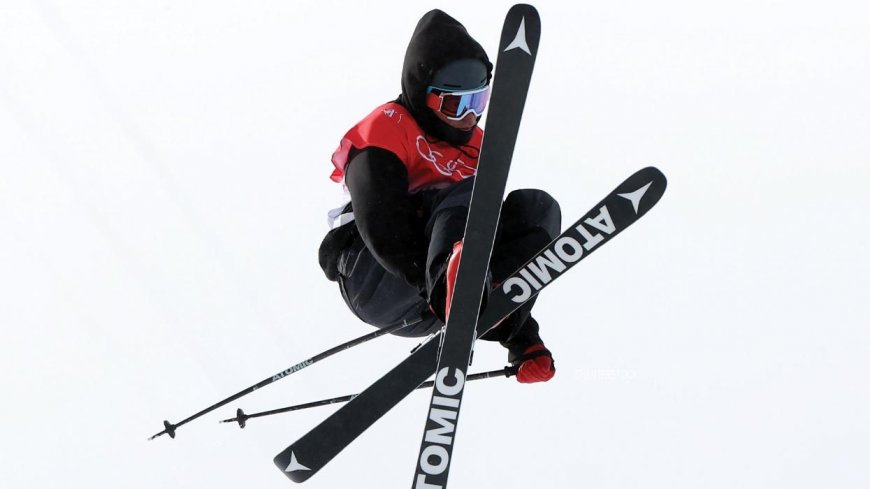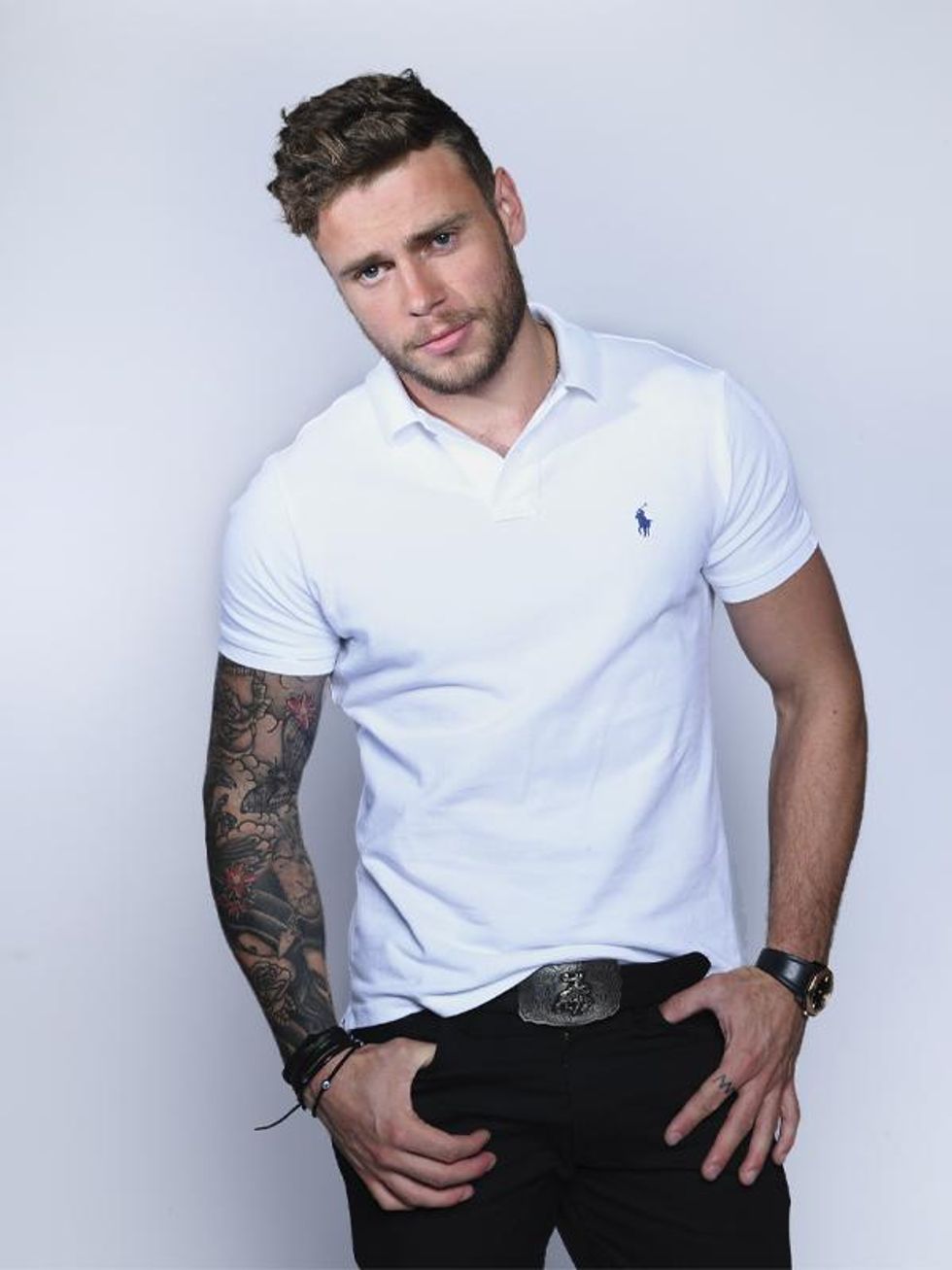Gus Kenworthy Is Up in The Air
The world’s most prominent and successful LGBTQ+ winter sports athlete, Gus Kenworthy, landed numerous World Cup wins and podiums throughout his career as a professional freestyle skier. He won the silver medal in the 2014 Winter Olympics in Sochi, Russia and then came out in 2015. His visibility gained him Human Rights Campaign honors and reached new heights when he famously kissed his boyfriend between competitions during the broadcast of the 2018 Olympics in South Korea.Born in England and moving with his parents and two older brothers to Telluride, Colorado, Kenworthy began skiing as a toddler and quickly moved up the ranks. He retired from professional skiing last winter following his third Olympics, the 2022 Winter Games in Beijing, China. Since then he’s pivoted to Hollywood, with appearances on RuPaul’s Drag Race, American Horror Story, and the MTV series The Challenge. The 31-year-old took a few moments to share some thoughts about his journey as a skier, the ski industry’s evolution in supporting the queer community, and what lies ahead for him.What personal challenges did you encounter as a gay athlete on the slopes?I actually didn't have any challenges when I was first learning to ski. I learned really young and immediately fell in love with the sport because it quickly became our family’s favorite pastime. I actually always felt like skiing itself was a really freeing experience. When you’re skiing, you’ve got the feeling of wind on your face and the sound of it in your ears and because you have to be present and aware of your surroundings, you kind of end up tuning out everything else that’s going on in your life and in your head. It’s very meditative. However, the industry and environment surrounding the sport always had an air of machismo and the language that got thrown around for much of my childhood was inherently homophobic. I was always hearing how things that were bad were gay and the f-slur was commonplace. In competitive skiing, what were your biggest hurdles as an LGBTQ+ person?A lot of the hurdles that were in my way were things that I was self-projecting and putting in my own way. Because of the language that was so commonly used I really believed that my sport was not a safe space or welcoming place for me to be my true self. After coming out I was met with so much support amongst my competitors that I realized I had been wrong to doubt many of them. As obvious as it was to me, they hadn’t previously had context to realize that the language they were using was hurtful. Quickly after my announcement I noticed a shift in the way people were talking and saw them making a conscious effort to be more mindful with their word choices, which meant a lot. The Washington Post/Getty ImagesYou came out in 2015. Why did that seem like the right time? I had actually never intended to come out while I was competing. I always thought I would finish my career in the closet and then get to come out and live my truth. Because there had never been an openly gay professional skier or any out professional athlete in any of the various action sports (skiing, snowboarding, skateboarding, surfing, mountain biking, bmx, motocross, etc.) I didn’t have a signal that it would be OK for me. Our income is based off of sponsorships, which are based off of image and because of the hyper-masculinity within those sports and the lack of an out role model within them, I worried I would lose sponsors and, in turn, lose my place within the sport.. Ultimately, after the 2014 Olympics I was thrust into the limelight in a way I never had been before and…closeting myself and holding onto that lie began to become more and more painful. I got to a point where I no longer cared whether I lost sponsors because I felt I had proven myself enough, accomplished what I had originally set out to, and was ready to live my truth regardless of the consequences.What could winter sports do to be more welcoming of the LGBTQ+ community?Massive strides have been made to make skiing and snowboarding more inclusive. Gay ski weeks [are] certainly helpful…however, it’s often simple things that are the most impactful in terms of making people feel seen and respected. Having employees preferred pronouns printed on their name tags is something that…would immediately make LGBTQ folks feel welcomed.Can you offer tips for any level of skier/rider working their way up in the sport as far as overcoming barriers?Wear a helmet and have fun. Push yourself as much as you feel comfortable and know that even if it doesn’t always seem like it, each time you hit the slopes you are progressing your skiing. Going out on the hill with people who are better than you is a great way to build your skills and confidence level, too.What’s next for you, career-wise? I’m not entirely sure what’s next, but I’ve got my hands in a few different baskets with the hopes that something takes off for me. I’m currently taking acting classes and auditioning here and there


The world’s most prominent and successful LGBTQ+ winter sports athlete, Gus Kenworthy, landed numerous World Cup wins and podiums throughout his career as a professional freestyle skier. He won the silver medal in the 2014 Winter Olympics in Sochi, Russia and then came out in 2015. His visibility gained him Human Rights Campaign honors and reached new heights when he famously kissed his boyfriend between competitions during the broadcast of the 2018 Olympics in South Korea.
Born in England and moving with his parents and two older brothers to Telluride, Colorado, Kenworthy began skiing as a toddler and quickly moved up the ranks. He retired from professional skiing last winter following his third Olympics, the 2022 Winter Games in Beijing, China. Since then he’s pivoted to Hollywood, with appearances on RuPaul’s Drag Race, American Horror Story, and the MTV series The Challenge.
The 31-year-old took a few moments to share some thoughts about his journey as a skier, the ski industry’s evolution in supporting the queer community, and what lies ahead for him.
What personal challenges did you encounter as a gay athlete on the slopes?
I actually didn't have any challenges when I was first learning to ski. I learned really young and immediately fell in love with the sport because it quickly became our family’s favorite pastime. I actually always felt like skiing itself was a really freeing experience. When you’re skiing, you’ve got the feeling of wind on your face and the sound of it in your ears and because you have to be present and aware of your surroundings, you kind of end up tuning out everything else that’s going on in your life and in your head. It’s very meditative. However, the industry and environment surrounding the sport always had an air of machismo and the language that got thrown around for much of my childhood was inherently homophobic. I was always hearing how things that were bad were gay and the f-slur was commonplace.
In competitive skiing, what were your biggest hurdles as an LGBTQ+ person?
A lot of the hurdles that were in my way were things that I was self-projecting and putting in my own way. Because of the language that was so commonly used I really believed that my sport was not a safe space or welcoming place for me to be my true self. After coming out I was met with so much support amongst my competitors that I realized I had been wrong to doubt many of them. As obvious as it was to me, they hadn’t previously had context to realize that the language they were using was hurtful. Quickly after my announcement I noticed a shift in the way people were talking and saw them making a conscious effort to be more mindful with their word choices, which meant a lot.
 The Washington Post/Getty Images
The Washington Post/Getty Images
You came out in 2015. Why did that seem like the right time?
I had actually never intended to come out while I was competing. I always thought I would finish my career in the closet and then get to come out and live my truth. Because there had never been an openly gay professional skier or any out professional athlete in any of the various action sports (skiing, snowboarding, skateboarding, surfing, mountain biking, bmx, motocross, etc.) I didn’t have a signal that it would be OK for me. Our income is based off of sponsorships, which are based off of image and because of the hyper-masculinity within those sports and the lack of an out role model within them, I worried I would lose sponsors and, in turn, lose my place within the sport.. Ultimately, after the 2014 Olympics I was thrust into the limelight in a way I never had been before and…closeting myself and holding onto that lie began to become more and more painful. I got to a point where I no longer cared whether I lost sponsors because I felt I had proven myself enough, accomplished what I had originally set out to, and was ready to live my truth regardless of the consequences.
What could winter sports do to be more welcoming of the LGBTQ+ community?
Massive strides have been made to make skiing and snowboarding more inclusive. Gay ski weeks [are] certainly helpful…however, it’s often simple things that are the most impactful in terms of making people feel seen and respected. Having employees preferred pronouns printed on their name tags is something that…would immediately make LGBTQ folks feel welcomed.
Can you offer tips for any level of skier/rider working their way up in the sport as far as overcoming barriers?
Wear a helmet and have fun. Push yourself as much as you feel comfortable and know that even if it doesn’t always seem like it, each time you hit the slopes you are progressing your skiing. Going out on the hill with people who are better than you is a great way to build your skills and confidence level, too.
What’s next for you, career-wise?
I’m not entirely sure what’s next, but I’ve got my hands in a few different baskets with the hopes that something takes off for me. I’m currently taking acting classes and auditioning here and there and also spending a lot of time writing with the intention of publishing a book, a collection of essays about my life, entirely written by me. As far as my involvement in skiing, I’d love to continue doing a few photo/video shoots each season andI’ll definitely attend some gay ski week events with friends. Otherwise, my plan is to ski with my family over Christmas and, ultimately, take a big step away from the sport.
Where is your favorite place to ski?
Telluride, Colorado, is hands down my favorite place to ski. It’s my home resort, so it holds a special place in my heart but after skiing all over the place I can honestly say the terrain is some of the best in the world. The scenery is unmatched and the base of the resort goes right down into town, which makes for great accessibility and aprés ski options. Also, because Telluride is so far from any other resorts or big cities it’s never particularly crowded. The busiest day of the season is less busy than a weekday at rival resorts.

 Mark
Mark 





